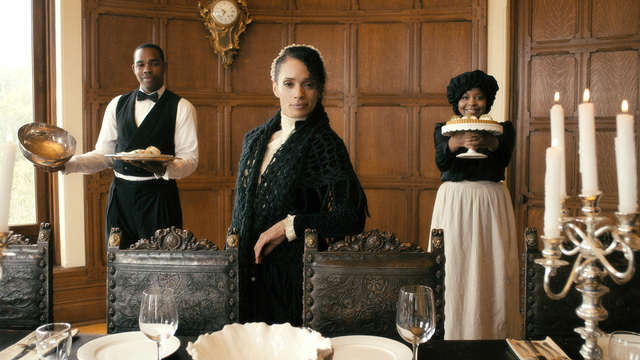Both the video clips that ran on Funny or Die and the episodes on Comedy Central feature A-list comedians and actors. Waters had the idea for the show while talking over drinks with his buddy Jake Johnson (a.k.a. Nick from New Girl). Their conversation was a recounting of a tale about Otis Redding gone wrong. In the first resulting episode of Drunk History, Johnson stars, along with Michael Cera (and Waters, who appears in many episodes), in a story about a duel between Alexander Hamilton and Aaron Burr.
It’s entertaining to see a well-known or favorite actor out of context, and it’s impossible to forget that Alexander Hamilton is really Michael Cera. The acting tends to be spot on, but the actors are at the whims of the narrator, who sometimes has to stop to yell at their dog or cough or curse or use present-day colloquialisms to get at the heart of the story.
When Ryan Gosling first pops out of bed in this reenactment of a telling of the classic Christmas poem, The Night Before Christmas, I can’t help but hear in my head, Hey, girl…
Waters doesn’t ask his viewers to forget who the actors are or to believe fully in the historical portrayal. Instead, the ridiculousness of the entire scenario creates -- or recreates, as it were -- a moment in time unlike any other.
Which brings me to…
2. You might learn something
However broken the narrative, the stories are true. The show employs a researcher and the inebriated narrators are people who know a lot about their subject matter. The first season on Comedy Central is structured a bit differently from the Funny or Die clips. Instead of presenting a single vignette, current episodes take place in a specific locale and feature multiple narrators telling anecdotes about the place, or about events that occurred in the vicinity. A recent episode took place in San Francisco and featured stories about Patty Hearst’s kidnapping (played by Kristen Wiig), Mark Twain’s unlikely beginning as a writer, and Mary Ellen Pleasant (played by Lisa Bonet), who was an abolitionist and businesswoman in the 1800s.
The Boston episode features none other than Winona Ryder as Mary Dyer, a feminist Puritan who rails against the establishment:
Need I say more? Winona as a bonnet-wearing Puritan? It might be that my own knowledge of history is sorely lacking (and it is), but many of the tales are among some of the lesser-known pieces to the much larger picture that is our nation’s complex, rich, and storied history.
3. Drunken storytelling
The show has a Falstaffian quality. Waters claims the guest historians are only meant to have a buzz, though more frequently than not they’re completely wasted. At times I worry a bit for the narrator, though they always manage (mostly) to pull it together and finish their story.
Hearing a story told aloud breathes new life into an old tale. The language is alive and shifting, and the nice thing about inebriation, in this context, is that the narrators seem less able to remain politically correct, or to sidestep the dark underbelly of truth. Sometimes they are also less able to use their words in general.
In the (hilarious) Lincoln episode, good ol’ Honest Abe is described, through the eyes of his lawyer counterparts as, “Oh my God, this guy is a lanky, gawky, awkward, ape-legged, ape-armed man. This guy is weird.” It is the repetition of Lincoln described as an ape that makes the story especially funny, even as it is hardly the point:
Drunk History is reality TV at its most grotesque and captivating best, but it’s also something more, part of a much longer lineage. The art of storytelling around a campfire or round table under the influence of some seemingly alchemical substance is not lost -- it’s simply come to Comedy Central.


